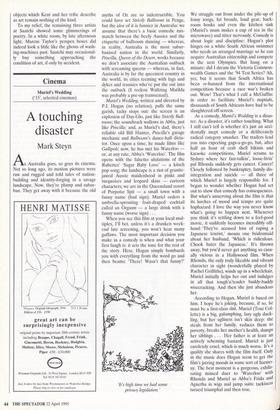Cinema
Muriel's Wedding (`15', selected cinemas)
A touching disaster
Mark Steyn
AAustralia goes, so goes its cinema. Not so long ago, its motion pictures were raw and rugged and told tales of nation- building and identity-forging in a savage landscape. Now, they're plump and subur- ban. They get away with it because the old myths of Oz are so indestructible. You could have set Strictly Ballroom in Penge, but the idea of it is funnier in Australia: we assume that there's a basic comedic mis- match between the beefy Aussies and the etiquette of ballroom dancing — whereas, in reality, Australia is the most subur- banised nation in the world. Similarly, Priscilla, Queen of the Desert, works because we don't associate the Australian outback with screaming queens — whereas, in fact, Australia is by far the queeniest country in the world, its cities teeming with fags and dykes and trannies who've put the out into the outback (I reckon Waltzing Matilda was probably a pre-op transsexual).
Muriel's Wedding, written and directed by P.J. Hogan (no relation), pulls the same garish, tacky stops out: the screen is an explosion of Day-Glo, just like Strictly Ball- room; the soundtrack wallows in Abba, just like Priscilla; and, as Muriel's dad, there's reliable old Bill Hunter, Priscilla's garage mechanic and Ballroom's dance-hall dicta- tor. Once upon a time, he made films like Gallipoli; now, he has met his Waterloo or, at any rate, Abba's 'Waterloo'. The film opens with the falsetto ululations of the Rubettes"Sugar Baby Love' — a kitsch pop song; the landscape is a riot of granite- jawed Aussie maidenhood in pinks and turquoises and leopard skins — cartoon characters; we are in the Queensland resort of Porpoise Spit — a small town with a funny name (bad sign); Muriel orders a umbrella-sprouting fruit-draped cocktail called an Orgasm — a large drink with a funny name (worse sign) . . .
When you see this film at your local mul- tiplex, I'll bet, unless it's a drunken week- end late screening, you won't hear many guffaws. The most important decision you make in a comedy is when and what your first laugh is: it sets the tone for the rest of the story. Here, Hogan simply bombards you with everything from the word go and then beams: 'There! Wasn't that funny?'
'It's high time we had some privacy legislation.' We struggle out from under the pile-up of lousy songs, fat broads, loud gear, back-
room bonks and even the kitchen sink (Muriel's mum makes a cup of tea in the microwave) and titter nervously. Comedy is about logic and discipline: Hogan's plot hinges on a white South African swimmer who needs an arranged marriage so he can acquire Australian citizenship and compete in the next Olympics. But hang on a minute: did I dream the Victoria Common- wealth Games and the '94 Test Series? Ah, yes, but it seems that South Africa has been re-banned from the international competition because a race war's broken out. Wow! That's what I call a McGuffin: in order to facilitate Muriel's nuptials, thousands of South Africans have had to be slaughtered off-screen.
As a comedy, Muriel's Wedding is a disas- ter. As a disaster, it's rather touching. What I still can't tell is whether it's just an acci- dentally inept comedy or a deliberately radical category smasher. The trailers lead you into expecting gags-a-go-go, but, after half an hour of crab shell bikinis and karaoke competitions, Muriel scrams to Sydney where her fast-talkin', loose-livin' pal Rhonda suddenly gets cancer. Cancer! Closely followed by bankruptcy, family dis- integration and suicide — all three of which Muriel is largely responsible for. I began to wonder whether Hogan had set out to show that comedy has consequences. But what's unnerving about the film is that its lurches of mood and tempo are quite haphazard. I love the way you never know what's going to happen next. Whenever you think it's settling down to a feel-good movie, it suddenly becomes incredibly off- hand: They've accused him of raping a Japanese tourist,' moans one bridesmaid about her husband, 'Which is ridiculous. Chook hates the Japanese.' It's thrown away, but you'd never get anything so casu- ally vicious in a Hollywood film. When Rhonda, the only truly likeable and vibrant character in sight (wonderfully played by Rachel Griffiths), winds up in a wheelchair, Muriel initially helps her out and indulges in all that tough'n'tender buddy-buddy wisecracking. And then she just abandons her.
According to Hogan, Muriel is based on him. I hope he's joking, because, if so, he must be a first-class shit. Muriel (Toni Col- lette) is a big, galumphing, lazy ugly duck- ling, but her ugliness isn't skin deep: she steals from her family, reduces them to poverty, breaks her mother's health, dumps her siblings . . Her father is at least an actively scheming bastard; Muriel is just carelessly cruel, which is much worse. It's a quality she shares with the film itself. Only in the music does Hogan seem to get the film's jarring moods in some sort of harmo- ny. The best moment is a gorgeous, exhila- rating mimed duet to 'Waterloo' with Rhonda and Muriel as Abba's Frida and Agnetha in wigs and jump suits: tackiness turned triumphal and then true.


























































 Previous page
Previous page